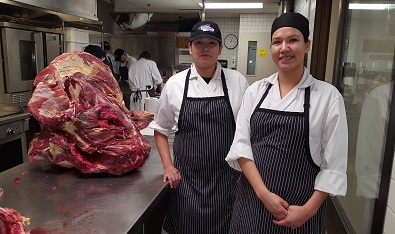Miranda Prosper and Kirsten Standing stand near the bison they’re processing this week. Photo by Chelsea Laskowski
Two Wahpeton women taking meat-cutting courses at Sask. Polytechnic’s Prince Albert campus are among those who spent hours this week processing 1,000 pounds of bison meat to donate to the Prince Albert Food Bank.
The five bison were illegally hunted outside Prince Albert National Park on Thanksgiving weekend, but luckily the meat was salvaged by the Saskatchewan Chapter of the Canadian Parks and Wilderness Society.
The bison make up more than two per cent of the only remaining herd of wild Plains bison within historic range, making their meat “precious,” according to Gord Vaadeland, executive director of the chapter.
CPAWS had been raising money to have the meat processed, when Sask. Polytechnic’s Retail Meat Specialist class stepped up to do it for free.
“We’re here, we need the training, we can do it,” said student Miranda Prosper.
She and her sister-in-law Kirsten Standing drive daily from their home reserve of Wahpeton to Prince Albert for school.
Now, they’ve turned the lean protein into ground bison, bison chops, roasts, and other cuts that will feed up to 7,000 meals for food bank clients. The food bank has gone without red meat for nearly six months.
For Prosper, the work they’ve done this week has turned the unfortunate act of poaching into a good deed that will help a lot of people at the food bank.
“It feels really wonderful,” she said.
Prosper and Standing are a few of the women in the male-dominated course, and Prosper said the skills they’re learning are culturally empowering.
“Traditionally I think a lot of Dakota women would have to know these skills from their ancestors and everything like that,” she said. “The women would be the ones to process the meat and everything, so it’s kind of cool to be able to do that.”
On Wahpeton, Prosper said there are occasional ceremonies where buffalo are slaughtered and shared amongst community members, but “it’s rare to have any of the girls in there doing it.
“Now that we have the training and skills and stuff we’ll be able to help with that sort of thing.”
Prosper said when students are done the course in February they’re “pretty much guaranteed a job” because there is high demand in the industry.
Students processing the bison meat. Photo by Chelsea Laskowski

